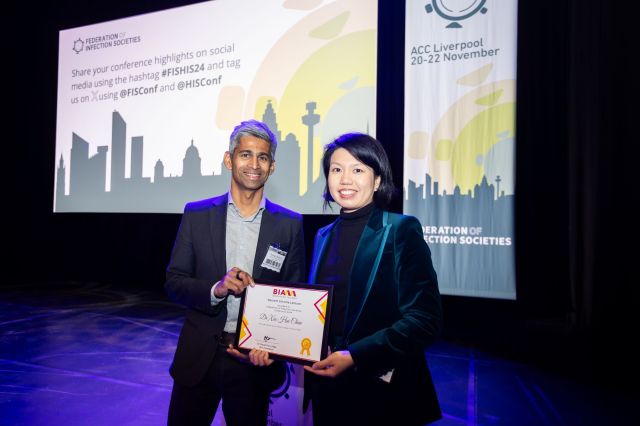
Early Career
With the award money from the 1999 Nobel Peace Prize, Médecin Sans Frontières (MSF) launched its Access to Essential Medicines Campaign and in 2003 set up the Drugs for Neglected Diseases initiative (DNDi). I started medical school a year later, moving to Oxford in the wake of the SARS outbreak in Southeast Asia which had taken the life of MSF Access Campaign co-founder and later World Health Organization (WHO) tropical infection specialist Carlo Urbani, my safe Singaporean upbringing upended by how quickly an infectious disease could transform – and end – life as we knew it. A malaria scare of my own in 2005 before gold-standard artemisinin-based combination therapies (ACTs) had reached rural Kenya where I was volunteering led me to a talk by Nick White, later my DPhil supervisor, on my return to Oxford. It became apparent to me that the world needed infectious diseases physicians who were also humanitarians, advocates, and scientists.
Research Career
As an international student and later junior doctor balancing night shifts and bleary-eyed commutes with ever-evolving visa requirements, sabbaticals for global health experience had to wait until around the time I was awarded Membership of the Royal College of Physicians. After the Diploma of Tropical Medicine and Hygiene short course at the London School of Hygiene and Tropical Medicine in 2015, I took up Nick’s offer of a year at the Wellcome Trust Major Overseas Programme in Thailand. With Nick’s encouragement and DPhil funding from the Medical Research Council, I returned to the climate-sensitive mosquito-borne infections of my Southeast Asian childhood which have formed the focus of my research career since. It was a steep learning curve I am still on: reverse (and third-) culture shock, the paradoxical isolation and intensity of frequent travel, multiple (programming) languages to (re-)learn, the practical ethics of rapid decision-making amidst asymmetry of information and resources, and the art and science of global health diplomacy. But in the eye of the storm I discovered an affinity for the big questions on the critical path of the design and delivery of drugs for tropical infections, and the complex interdisciplinary solutions they required, consulting for WHO on these.
The first of these questions was the delicate risk-benefit balance of the double lives of the entire class of antimalarials structurally related to quinine, itself isolated from the cinchona bark in 1820. Apart from being treatments for fever and ague for millennia, these botanical alkaloids were also the first anti-arrhythmics. Following the sudden death of a teenage girl in a mass drug administration programme of ACTs, with an extensive global evidence review, we were able to reassure WHO and the malaria community that WHO-recommended doses and combinations of ACTs continued to be safe to use without routine ECG monitoring.
After submitting my DPhil thesis (later awarded without corrections) at the start of the COVID-19 pandemic, I duly returned to London to complete infectious diseases specialty training. I feel deeply fortunate to have had Sarah Rowland-Jones and later Sharon Peacock as my anchors to the clinical academic pathway. It’s actually quite hard to say no to either of them when they’re telling you something you ought to listen to! Even in the darkest days of the pandemic, I was sustained by the camaraderie of uniting with researchers and other healthcare workers around the world to combat the overwhelming threat to life as we knew it. Realising I needed more research time, I moved back to Oxford for an NIHR Academic Clinical Lectureship in Infectious Diseases.
It was back in Oxford that I found my second set of questions on the essential characteristics of treatments for dengue fever to permit wide access and rapid scale-up during the global emergency of 2023-2024. In particular, the complexities around efficacy endpoint selection and safety monitoring requirements for expanding definitions of risk groups ineligible for vaccination. The WHO Call for Public Consultation was recently released for World Dengue Day 2025. Now, more than ever in healthcare systems strained by COVID-19 and increasingly by climate change, safe and effective temperature-stable oral antiviral drugs suitable for administration in the community for all patients whatever their age, comorbidities, socio-economic status, or geographical location are needed.
ESCMID Young Scientist Travel Award and Barnett Christie Prize Lecture
I was fortunate to secure a BIA-European Society of Clinical Microbiology and Infectious Diseases (ESCMID) Young Scientist Travel Award in 2024. I did not expect in my wildest dreams to then be awarded the Barnett Christie Prize Lecture 2024 a few months later as I was not certain if my research was relevant to UK practice. This was in turn followed by an ESCMID Young Investigator Award 2025 (award lecture). I am most grateful to BIA, and especially Rajeka Lazarus and Thushan de Silva, for your belief in me. My heartfelt thanks also to the Oxford University Clinical Academic Graduate School, and especially Chris Pugh, for the patient nurture during this academic growth spurt. My clinical supervisors Matt Scarborough, Andrew Brent, and Ivo Elliott kept me focused and upright on the tightrope towards CCTs in Infectious Diseases and General Internal Medicine, curriculum changes and all. Applying for the Barnett Christie Lecture was Andrew’s idea!
Latest Project
In these strange times for global health, there is a lot still to be done even in the UK. My latest project, as part of the UK Malaria Expert Advisory Group, is to enable UK access to the dispersible paediatric formulation for the second-line ACT in the soon-to-be updated BIA antimalarial treatment guidelines. Through a clinical academic, policy, or industry role, or perhaps a combination of these, I am looking forward to continuing my mission to accelerate access to essential medicines for tropical infections in the years to come. Do get in touch if you’d like to discuss new opportunities or collaborations.
